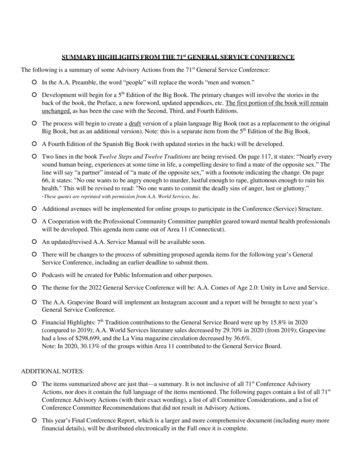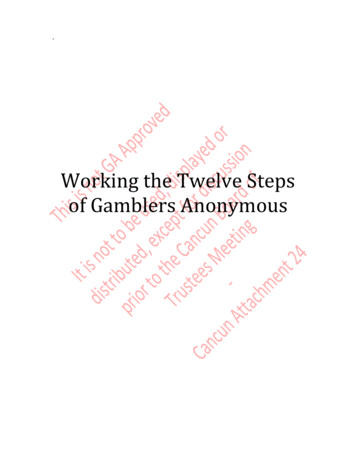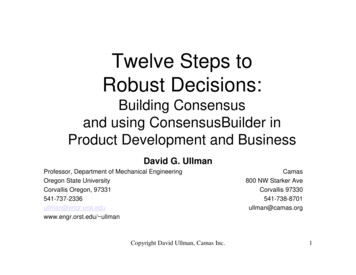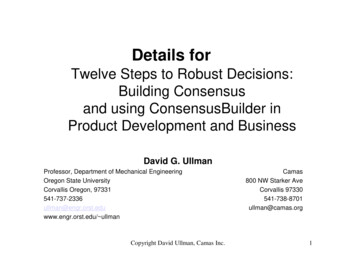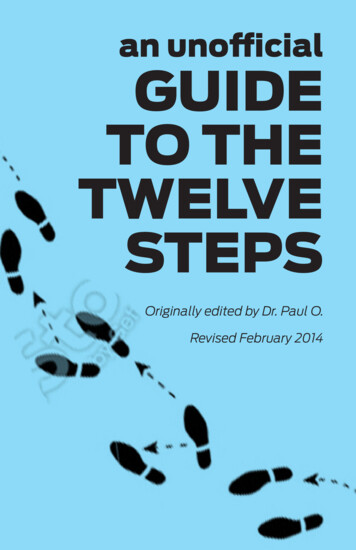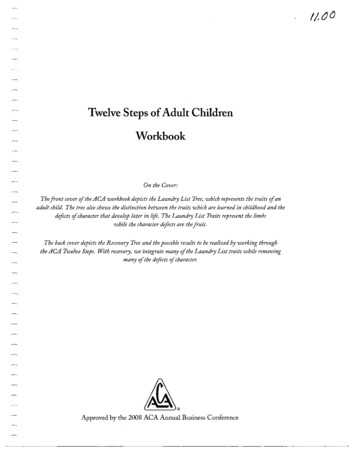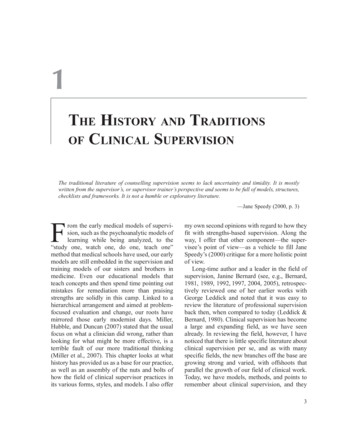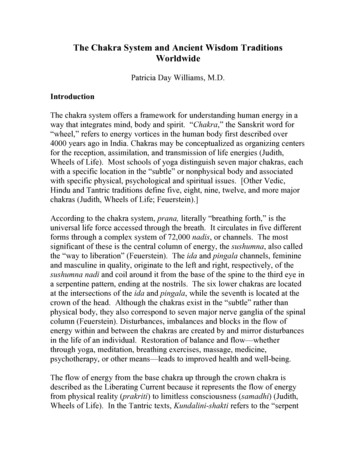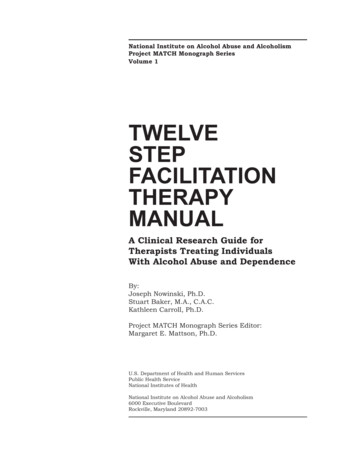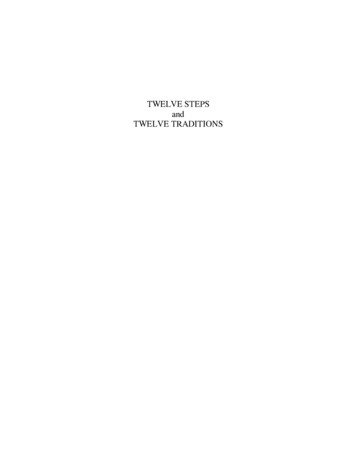
Transcription
TWELVE STEPSandTWELVE TRADITIONS
TWELVESTEPSandTWELVETRADITIONS—x—ALCOHOLICS ANONYMOUS WORLD SERVICES, INC.BOX 459, GRAND CENTRAL STATIONNEW YORK, NY 10163
Copyright 1952, 1953, 1981 by The A.A. Grapevine,Inc. and Alcoholics Anonymous Publishing (nowknown as Alcoholics Anonymous World Services, Inc.)All rights reservedFirst Printing, April 1953Sixty-fourth Printing, January 2003Windows Help version, July 1994*Electronic .PDF version, September 2005 This edition is NOT A.A. GeneralService Conference approved literatureALCOHOLICS ANONYMOUS and A.A. are registeredtrademarks of A.A. World Services, Inc.ISBN 0-916856-01-1Library of Congress Catalog Card No. 53-5454Printed in the United States of America* Transcribed by “ Mr. D.” . Software development by cyb. .PDF version based upon the text of the Windows Help versionand published by ARID Media. A.A. World Services and itssubsidiaries were not involved within the production of thisspecific work.
ContentsForeword15THE TWELVE STEPSStep One21“ We admitted we were powerless over alcohol—thatour lives had become unmanageable.”Who cares to admit complete defeat? Admission of powerlessness is the first step in liberation. Relation of humility to sobriety. Mental obsession plus physical allergy.Why must every A.A. hit bottom?Step Two25“ Came to believe that a Power greater than ourselvescould restore us to sanity.”What can we believe in? A.A. does not demand belief;Twelve Steps are only suggestions. Importance of an openmind. Variety of ways to faith. Substitution of A.A. asHigher Power. Plight of the disillusioned. Roadblocks ofindifference and prejudice. Lost faith found in A.A. Problems of intellectuality and self-sufficiency. Negative andpositive thinking. Self-righteousness. Defiance is an outstanding characteristic of alcoholics. Step Two is a rallying point to sanity. Right relation to God.Step Three34“ Made a decision to turn our will and our lives over tothe care of God, as we understood Him.”Step Three is like opening of a locked door. How shall welet God into our lives? Willingness is the key. Dependence as a means to independence. Dangers of self-suffi5
6C O N T E N T Sciency. Turning our will over to Higher Power. Misuse ofwillpower. Sustained and personal exertion necessary toconform to God's will.Step Four42“Made a searching and fearless moral inventory ofourselves.”How instincts can exceed their proper function. Step Fouris an effort to discover our liabilities. Basic problem ofextremes in instinctive drives. Misguided moral inventorycan result in guilt, grandiosity, or blaming others. Assetscan be noted with liabilities. Self-justification is dangerous. Willingness to take inventory brings light and newconfidence. Step Four is beginning of lifetime practice.Common symptoms of emotional insecurity are worry,anger, self-pity, and depression. Inventory reviews relationships. Importance of thoroughness.Step Five55“ Admitted to God, to ourselves, and to another humanbeing the exact nature of our wrongs.”Twelve Steps deflate ego. Step Five is difficult but necessary to sobriety and peace of mind. Confession is an ancient discipline. Without fearless admission of defects,few could stay sober. What do we receive from StepFive? Beginning of true kinship with man and God. Losesense of isolation, receive forgiveness and give it; learnhumility; gain honesty and realism about ourselves. Necessity for complete honesty. Danger of rationalization.How to choose the person in whom to confide. Results aretranquility and consciousness of God. Oneness with Godand man prepares us for following Steps.Step Six“Were entirely ready to have God remove all thesedefects of character.”Step Six necessary to spiritual growth. The beginning of a63
C O N T E N T S7lifetime job. Recognition of difference between strivingfor objective—and perfection. Why we must keep trying.“ Being ready” is all-important. Necessity of taking action.Delay is dangerous. Rebellion may be fatal. Point atwhich we abandon limited objectives and move towardGod's will for us.Step Seven70“ Humbly asked Him to remove our shortcomings.”What is humility? What can it mean to us? The avenue totrue freedom of the human spirit. Necessary aid to survival. Value of ego-puncturing. Failure and misery transformed by humility. Strength from weakness. Pain is theadmission price to new life. Self-centered fear chief activator of defects. Step Seven is change in attitude whichpermits us to move out of ourselves toward God.Step Eight77“Made a list of all persons we had harmed, andbecame willing to make amends to them all.”This and the next two Steps are concerned with personalrelations. Learning to live with others is a fascinating adventure. Obstacles: reluctance to forgive; nonadmission ofwrongs to others; purposeful forgetting. Necessity of exhaustive survey of past. Deepening insight results fromthoroughness. Kinds of harm done to others. Avoiding extreme judgments. Taking the objective view. Step Eight isthe beginning of the end of isolation.Step Nine“Made direct amends to such people whereverpossible, except when to do so would injure them orothers.”A tranquil mood is the first requisite for good judgment.Good timing is important in making amends. What iscourage? Prudence means taking calculated chances.Amends begin when we join A.A. Peace of mind cannot83
8C O N T E N T Sbe bought at the expense of others. Need for discretion.Readiness to take consequences of our past and to take responsibility for well-being of others is spirit of Step Nine.Step Ten88“Continued to take personal inventory and when wewere wrong promptly admitted it.”Can we stay sober and keep emotional balance under allconditions? Self-searching becomes a regular habit. Admit, accept, and patiently correct defects. Emotional hangover. When past is settled with, present challenges can bemet. Varieties of inventory. Anger, resentments, jealously, envy, self-pity, hurt pride—all led to the bottle. Selfrestraint first objective. Insurance against “big-shot-ism.”Let's look at credits as well as debits. Examination of motives.Step Eleven96“Sought through prayer and meditation to improve ourconscious contact with God as we understood Him,praying only for knowledge of His will for us and thepower to carry that out.”Meditation and prayer main channels to Higher Power.Connection between self-examination and meditation andprayer. An unshakable foundation for life. How shall wemeditate? Meditation has no boundaries. An individualadventure. First result is emotional balance. What aboutprayer? Daily petitions for understanding of God's willand grace to carry it out. Actual results of prayer are beyond question. Rewards of meditation and prayer.Step Twelve“Having had a spiritual awakening as the result ofthese steps, we tried to carry this message toalcoholics, and to practice these principles in all ouraffairs.”Joy of living is the theme of the Twelfth Step. Action its106
C O N T E N T S9keyword. Giving that asks no reward. Love that has noprice tag. What is spiritual awakening? A new state ofconsciousness and being is received as a free gift. Readiness to receive free gift lies in practice of Twelve Steps.The magnificent reality. Rewards of helping other alcoholics. Kinds of Twelfth Step work. Problems of TwelfthStep work. What about the practice of these principles inall our affairs? Monotony, pain and calamity turned togood use by practice of Steps. Difficulties of practice.“Two-stepping.” Switch to “twelve-stepping” and demonstrations of faith. Growing spiritually is the answer to ourproblems. Placing spiritual growth first. Domination andoverdependence. Putting our lives on give-and-take basis.Dependence upon God necessary to recovery of alcoholics. “Practicing these principles in all our affairs”: Domestic relations in A.A. Outlook upon material matterschanges. So do feelings about personal importance. Instincts restored to true purpose. Understanding is key toright attitudes, right action key to good living.THE TWELVE TRADITIONSTradition One129“Our common welfare should come first; personalrecovery depends upon A.A. unity.”Without unity, A.A. dies. Individual liberty, yet great unity. Key to paradox: each A.A.'s life depends on obedienceto spiritual principles. The group must survive or the individual will not. Common welfare comes first. How best tolive and work together as groups.Tradition Two“For our group purpose there is but one ultimate132
10C O N T E N T Sauthority—a loving God as He may express Himself inour group conscience. Our leaders are but trustedservants; they do not govern.”Where does A.A. get its direction? Sole authority in A.A.is loving God as He may express Himself in the groupconscience. Formation of a group. Growing pains. Rotating committees are servants of the group. Leaders do notgovern, they serve. Does A.A. have a real leadership?“Elder statesmen” and “bleeding deacons.” The groupconscience speaks.Tradition Three139“ The only requirement for A.A. membership is a desireto stop drinking.”Early intolerance based on fear. To take away any alcoholic's chance an A.A. was sometimes to pronounce hisdeath sentence. Membership regulations abandoned. Twoexamples of experience. Any alcoholic is a member ofA.A. when he says so.Tradition Four146“ Each group should be autonomous except in mattersaffecting other groups or A.A. as a whole.”Every group manages its affairs as it pleases, except whenA.A. as a whole is threatened. Is such liberty dangerous?The group, like the individual, must eventually conformto principles that guarantee survival. Two storm signals—a group ought not do anything which would injure A.A. asa whole, nor affiliate itself with outside interests. An example: the “A.A. Center” that didn't work.Tradition Five“ Each group has but one primary purpose—to carrythe message to the alcoholic who still suffers.”Better do one thing well than many badly. The life of ourFellowship depends on this principle. The ability of eachA.A. to identify himself with and bring recovery to the150
C O N T E N T S11newcomer is a gift from God . . . passing on this gift toothers is our one aim. Sobriety can't be kept unless it isgiven away.Tradition Six155“An A.A. group ought never endorse, finance or lendthe A.A. name to any related facility or outsideenterprise, lest problems of money, property andprestige divert us from our primary purpose.”Experience proved that we could not endorse any relatedenterprise, no matter how good. We could not be allthings to all men. We saw that we could not lend the A.A.name to any outside activity.Tradition Seven160“Every A.A. group ought to be fully self-supporting,declining outside contributions.”No A.A. Tradition had the labor pains this one did. Collective poverty initially a matter of necessity. Fear of exploitation. Necessity of separating the spiritual from thematerial. Decision to subsist on A.A. voluntary contributions only. Placing the responsibility of supporting A.A.headquarters directly upon A.A. members. Bare runningexpenses plus a prudent reserve is headquarters policy.Tradition Eight“Alcoholics Anonymous should remain forevernonprofessional, but our service centers may employspecial workers.”You can't mix the Twelfth Step and money. Line of cleavage between voluntary Twelfth Step work and paid-forservices. A.A. could not function without full-time serviceworkers. Professional workers are not professional A.A.'s.Relation of A.A. to industry, education, etc. Twelfth Stepwork is never paid for, but those who labor in service forus are worthy of their hire.166
12C O N T E N T STradition Nine172“ A.A., as such, ought never be organized; but we maycreate service boards or committees directlyresponsible to those they serve.”Special service boards and committees. The General Service Conference, the board of trustees, and group committees cannot issue directives to A.A. members or groups.A.A.'s can't be dictated to—individually or collectively.Absence of coercion works because unless each A.A. follows suggested Steps to recovery, he signs his own deathwarrant. Same condition applies to the group. Sufferingand love are A.A.'s disciplinarians. Difference betweenspirit of authority and spirit of service. Aim of our services is to bring sobriety within reach of all who want it.Tradition Ten176“Alcoholics Anonymous has no opinion on outsideissues; hence the A.A. name ought never be drawn intopublic controversy.”A.A. does not take sides in any public controversy. Reluctance to fight is not a special virtue. Survival and spreadof A.A. are our primary aims. Lessons learned fromWashingtonian movement.Tradition Eleven“Our public relations policy is based on attractionrather than promotion; we need always maintainpersonal anonymity at the level of press, radio andfilms.”Public relations are important to A.A. Good public relations save lives. We seek publicity for A.A. principles,not A.A. members. The press has cooperated. Personalanonymity at the public level is the cornerstone of ourpublic relations policy. Eleventh Tradition is a constantreminder that personal ambition has no place in A.A.Each member becomes an active guardian of our Fellowship.180
C O N T E N T STradition Twelve13184“Anonymity is the spiritual foundation of all ourtraditions, ever reminding us to place principles beforepersonalities.”Spiritual substance of anonymity is sacrifice. Subordinating personal aims to the common good is the essence ofall Twelve Traditions. Why A.A. could not remain a secret society. Principles come before personalities. Onehundred percent anonymity at the public level. Anonymity is real humility.The Twelve Traditions—the Long Form189
ForewordALCOHOLICS ANONYMOUS is a worldwide fellowship of more than one hundred thousand* alcoholic menand women who are banded together to solve their common problems and to help fellow sufferers in recovery fromthat age-old, baffling malady, alcoholism.This bo
Over the years, ever y conceivable deviation fro m our Twelve Steps and Traditions has been tried. That was sure to be, since we are so largely a band of ego-driven individ- ualists. Children of chaos, File Size: 1MBPage Count: 194Explore furtherAlcoholics Anonymous : Twelve Steps and Twelve Traditionswww.aa.orgPrintable 12 Steps of Alcoholics Anonymous (Free PDF .dailyrecovery.clubP-28 - The Twelve Traditions of Alcoholics Anonymouswww.aa.orgTwelve Steps - Step One - (pp. 21-24) - A.Awww.aa.orgAlcoholics Anonymous : Read the Big Book and Twelve Steps .www.aa.orgRecommended to you based on what's popular Feedback
